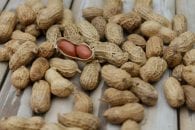New Research on Infant Food Allergies
Once upon a time, it was customary to advise mom to avoid certain foods in her diet while breastfeeding, especially if there was a family history of food allergies. New research, though still in its infancy, suggests otherwise and has resulted in new peanut allergy guidelines for introducing peanuts to babies. The U.S. Food and Drug Administration now recognizes new guidelines outlined by the National Institute of Allergy and Infectious Disease (NIAID) along with a few other groups. These guidelines recommend that a baby be introduced to peanuts early on to “train their immune system.” View video here.
Guidelines of Exposing Babies to Peanuts
Recent studies reveal that tiny amounts of peanut exposure to infants actually decrease the chance of these infants developing peanut allergies later on. One clinical trial found introducing peanuts to babies led to an 81 percent reduction in the subsequent development of the allergy, as reported by the NIAID. This strategy, helps to slowly introduce common allergy foods into a baby’s diet. The NIAID guidelines recommend extremely small exposures, such as peanut paste or powder, but advise against large exposures, such as large as an entire peanut. According to these new guidelines, even babies with a high risk of peanut allergies can and should be introduced to this food using micro exposure. This slow exposure helps to avoid an overreaction by the body later on in childhood.
Micro Exposure During Breastfeeding
While writing this, I attended a scientific seminar on the subject of micro exposure. The presenting immunologist proposed the idea of gradually exposing the immune cells, which are being trained in baby’s maturing gut lining, to recognize these foods as “good guys.” This way the baby’s body does fight them, resulting in the immune system being less likely to trigger allergic reactions to these foods. We theorize that this could be why breastfeeding infants tend to have a lower incidence of food allergies later on, since the mother’s milk can expose the baby to micro amounts of certain trigger foods, called micro exposure. Could the “micro exposures” to foods, such as nuts, eggs, seafood, soy, and so on, in a breastfeeding mother’s diet eventually lessen her baby’s risk of allergies to these foods? Stay tuned for more research on this fascinating subject, which we will post on our website: AskDrSears.com/breastfeeding.
Sources:
https://www.niaid.nih.gov/news-events/study-finds-peanut-consumption-infancy-prevents-peanut-allergy

